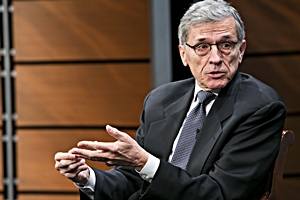FCC won’t discuss plan to push states to repeal government-owned Internet laws

By Chris Butler | Tennessee Watchdog
NASHVILLE — Government-owned Internet systems, especially in Tennessee, have lost taxpayer money, and state officials have laws in place to keep them from expanding — but now the Federal Communications Commission wants states to repeal those laws.
FCC officials, however, wouldn’t discuss with Tennessee Watchdog on Thursday how, precisely, they plan to push state and local governments around the country into repealing those laws.
By law, government-owned Internet systems in Tennessee — usually carried out through public utilities — may not expand outside a public utility’s designated service area, usually a city.
As previously reported, government-owned Internet systems have impacted private Internet service providers for the worse.
But FCC Chairman Tom Wheeler wants these systems expanded, all on the basis of increasing competition, according to a statement he released this year.
POINTS: Federal Communications Commission Chairman Tom Wheeler
In an email, FCC spokesman Neil Grace attributed this statement to Wheeler:
“I have said before that I believe the FCC has the power, and I intend to exercise that power, to pre-empt state laws that ban competition from community broadband.
“One place where it may be possible is municipally owned or authorized broadband systems. I understand that the experience with community broadband is mixed, that there have been both successes and failures. But if municipal governments — the same ones that granted cable franchises — want to pursue it, they shouldn’t be inhibited by state laws.”
Grace, however, did not answer Tennessee Watchdog’s questions about how the agency plans to carry this out, on what timetable and with what resources. He also wouldn’t comment on prior reports that government-owned Internet systems have lost taxpayer money.
Additionally, he wouldn’t answer a question about private Internet and cable companies that carry bad customer service reputations because of government laws that allow them to have a monopoly.
The CNN piece, which seemed more an advertisement than a legitimate news article, portrayed Chattanooga as an innovative city that has made life better for residents frustrated with slow Internet speeds provided by private competitors.
EPB, the CNN article suggested, was a victim of lawsuits from Comcast and other local cable and Internet providers who feared government competition.
One of those providers, David Snyder, told Tennessee Watchdog in 2011 that private competitors could provide the same services for pennies on the dollar of what the government spent — when the free market demanded it.
Snyder and most other service providers in the area now avoid Chattanooga, he said.
As previously reported, the Clarksville Department of Electricity experienced two major outages with their Internet in March and April of this year, costing angry business owners a lot of money.
“CDE Lightband does not have a stellar reputation at this point, in my opinion, and is a relatively new service,” library director Martha Hendricks said in April.
As Tennessee Watchdog reported, Tullahoma’s Fiber Optics Fund now has a deficit of $2.3 million, according to state Comptroller Justin Wilson’s most recent audit. The deficit was $1.6 million the prior year.
When Tennessee Watchdog last checked, the Gigabit service only had one customer.
Only about one-third of Tullahoma’s residents use LightTUBe, while the remainder use private competitors, Jody Baltz, city administrator, previously told Tennessee Watchdog.
Tullahoma Mayor Lane Curlee told Tennessee Watchdog in December the city’s investment into these services hasn’t paid off.
In fact, 75 percent to 80 percent of government-run communications systems throughout the nation do not make money, Rizzuto said.
But does it matter to government officials?
Tullahoma LightTUBe General Manager Brian Skelton, who in the past has refused to talk to Tennessee Watchdog, said this to the Tullahoma News:
Contact Christopher Butler at chris@tennesseewatchdog.org. or follow him and submit story ideas on his official Facebook page.
Get regular Tennessee Watchdog updates through our Facebook or Twitter accounts
Like Watchdog.org? Click HERE to get breaking news alerts in YOUR state!
Please, feel free to “steal our stuff”! Just remember to credit Watchdog.org. Find out more








